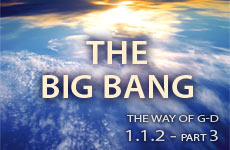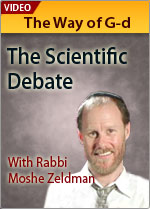 Iran’s Attack on Israel
Iran’s Attack on Israel


10 min read
A world that is getting older has to have a starting point.
 1:1:2 (part 3)
1:1:2 (part 3)
Section 1: Fundamentals of Existence
Chapter 1: The Creator
Point 2
So far in our investigation of the logical basis for an infinite existence, we've ruled out two possibilities:
Other than the G-d option (an infinite being), we have one more possibility to examine:
This option seems to be the only viable alternative to an infinite G-d. Let's examine if it is indeed viable. The ancient Greeks were bothered by the same cosmological questions that we are dealing with here. As the philosopher Lucretius asked, "Why is there something, rather than nothing?" In other words, why does the universe exist?
Aristotle, in Metaphysics, challenged a basic assumption that we've been making until now: Who says there was ever a beginning? Aristotle would agree that anything that has a beginning requires a beginner, but something that has always existed doesn't necessitate the existence of a beginner.
At first glance, this argument is compelling. Aristotle is not proving that the universe has no beginning, but rather he's casting the burden of proof on the Torah worldview to demonstrate that the universe indeed does have a beginning. Aristotle's retort to "In the beginning" is: "How do you know there was one?"
There are two lines of reasoning that make the idea of an eternally-old universe impossible: logic and modern science.
In our modern world the idea of an eternally old universe, i.e. a universe that has no beginning, has been decisively disproven, most notably by the discovery of the big bang. As Dr. Gerald Schroeder points out,1 as of 1959, two-thirds of US astronomers and physicists believed that the universe was eternally old (i.e. had no beginning). In the intervening years, there has been a dramatic turnaround. Now, the vast majority of scientists are convinced, based on the incontrovertible evidence of a big bang, that the universe had a distinct beginning in time, some 10-15 billion years ago.
Once scientists discovered that all of physical reality came in to existence at a specific point in time, it clearly begs the question: "What prior force created the big bang?" If all of time and space began from a specific particle at a specific instant, then something beyond nature must be responsible for the existence of that first particle that exploded. British theorist Edward Milne wrote a mathematical treatise on the theory of relativity. He concludes it by saying, "As to the first cause of the universe, in the context of expansion, that is left for the reader to insert, but the picture is incomplete without Him."
But of course, when Maimonides and his contemporaries set out to show that an eternal universe, i.e. the Greek view, is illogical, they obviously didn't have the benefit of modern scientific discoveries. How were they able to support their position on purely logical grounds? The Greeks are claiming that the universe has been around forever, that is, for an infinite amount of time. Can that claim be refuted?
The refutation is contained in one simple piece of logic: If the world is infinitely old, then how can it still be getting older? In other words, there's a fundamental difficulty with stating that something – in our example, "time" – is infinitely big and yet getting bigger. Can an infinitely long line get any longer? Of course not. You might say that this line is so long that it's not measurable. But if you tell me that this line is continuously getting longer, then it can't already be infinitely long! "Infinitely long" by definition means that it already exceeds all possible limitations. The Greeks are proposing that the universe is "infinitely old," and yet we know that as every day goes by, we, along with everything in this universe, are getting older. That would be utterly illogical.
By way of example, let's say that Maimonides met Aristotle one day and as they were walking along, they came across a huge pile of marbles. This pile is so huge that as they look with telescopes in every direction, they can't see any end to the pile. It seems to go on forever.
Aristotle: "I believe that this is an infinitely large pile of marbles."
Maimonides: "Look, I have no idea how many marbles are here, but logically it must be finite. Here's my proof: What would happen, Aristotle, if I removed one marble from the pile? How many marbles would be left now? An infinite number or a finite number?"
Aristotle: "Finite."
Maimonides: "Well, if it's finite now, then what will happen when I put this marble back into the pile? Will the pile go from being finite to infinite? Impossible! Finite-plus-one is just a slightly bigger finite!"
Aristotle: "Okay then, if you remove one marble, I say the pile must still be infinite."
Maimonides: "Well then, you've got an even bigger problem. Because now the pile is infinite – but it's a little smaller then it was before?! How can an infinite pile change in size? And if I add three more marbles, it will be bigger yet just as infinite? There's only one logical possibility: The pile must be finite. It might be uncountable, but there must be a specific, finite, number of marbles in the pile."
That's essentially what the Greeks proposed: Time is infinitely old, yet getting older all the time. Or that an infinite number of events have already taken place in the universe, and yet the number of events is constantly growing as new things happen every day. It's logically impossible.
Now that we've eliminated all the other possibilities, we're left with one view: An infinite force must have created this finite world. And the more we ponder infinite existence, the more we realize how unimaginable it is.
However, by what right do we say that this force is a "Being" that "decided" to create? How do we know that this Being is caring, just and powerful? We'll tackle these questions as we go on in the chapter.
One question which could be asked at this point, is the classical atheist retort: "Well, who made G-d?" And if we're going to say that G-d is an uncaused entity, why not just say that about the universe itself – that the universe "was, is and will be eternally" without cause.
We have to notice a subtle but critical difference in the claim, however. In our original argument, point (1) was: We know that all finite things have a prior cause that brought them into existence. Since the universe is finite – i.e. it's made of matter, it's existed for several billion years, it contains a certain amount of energy, etc. – then we can't simply say "the universe is uncaused" any more than we can postulate that the chair you're sitting on is uncaused. It violates our most basic understanding of the workings of nature to say that something "just exists" without a cause.
On the other hand, there's no reason for us to apply this limitation of nature to a being who is above and beyond that nature. In other words, in the finite system that we experience, there's a universal law of cause and effect that cannot be denied. Those are the laws that govern how the system of finite operates. We are simply deducing that there must be something outside of the system that created it with its rules and limitations. There's no reason to suggest that if G-d makes a world (i.e. a system of causes and effects), He must be bound the rules of the system He created. It would be like saying that since my friend manufactures AM radios, you can't hear him when he walks in tunnels!

This argument we've been discussing – the existence of an infinite being that created our finite world – is classically known as the "cosmological argument for G-d's existence." We have to keep in mind that Maimonides, Rabbi Saadiah Gaon and others formulated this argument nearly 1,000 years ago, based on principles of logical deduction. Since that time, of course, there have been tremendous advancements in science, especially with the 20th century discoveries of the theory of relativity and quantum mechanics. Do modern scientific findings strengthen or weaken the argument?
With regard to the Greek view of an eternal universe, this is the view that was widely held by most scientists and philosophers for thousands of years. As mentioned earlier, this totally does away with any need to ask, "Who created the universe?" But with Professor Edwin Hubble's 1920s discovery that the universe is expanding, it forced scientists to reconsider. If the universe is expanding, then billions of years ago it must have been much smaller... and before that even smaller. So there must have been a point at which it all began, hence the big bang. Scientific American in 1976 described it as follows:
The universe began from a state of infinite density... Space and time were created in that event and so was all the matter in the universe. It is not meaningful to ask what happened before the Big Bang; it is like asking what is north of the North Pole. Similarly, it is not sensible to ask where the Big Bang took place. The point-universe was not an object isolated in space; it was the entire universe, and so the answer can only be that the Big Bang happened everywhere.2
In other words, since the big bang marked the beginning point of the entire universe, it wasn't expanding into something else. It was all of finite existence – all of time and space.
At one point, scientists attempted to avoid the theological conclusions of this discovery by positing an "oscillating" universe. In other words, perhaps the universe that is now expanding will one day reach a limit and then collapse, then go through another cycle of big bang where it will expand again, and then collapse, ad infinitum. And perhaps it has already been expanding and collapsing forever! Hence, a resurrection of the Greek model.
The general consensus among scientists today is that, given the nature of the universe, it is a physical impossibility. According to two current prominent cosmologists, Sandage and Tammann, "...we are forced to decide that... it seems inevitable that the Universe will expand forever... the Universe has happened only once."3 And according to Novikov and Zeldovich of the Institute of Applied Mathematics of the USSR Academy of Sciences, "The multicycle model [i.e. continuously going through cycles of expansion and contraction] has an infinite future, but only a finite past."4
![]()
